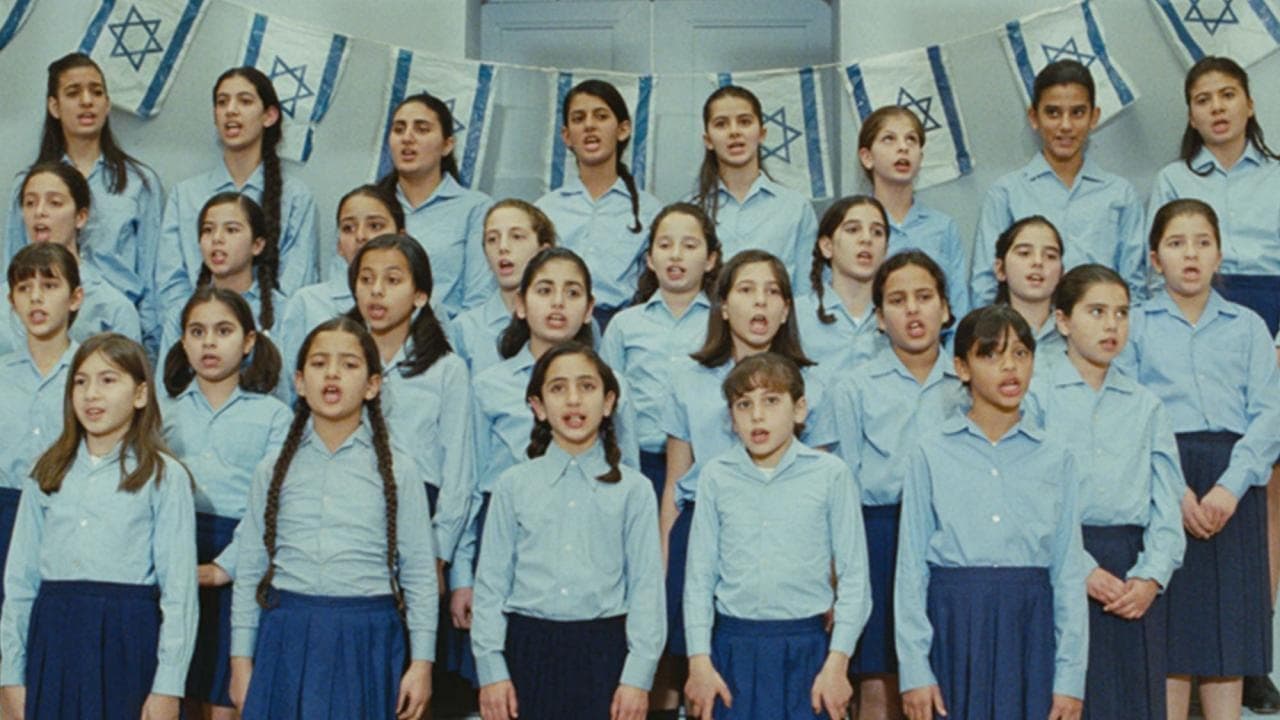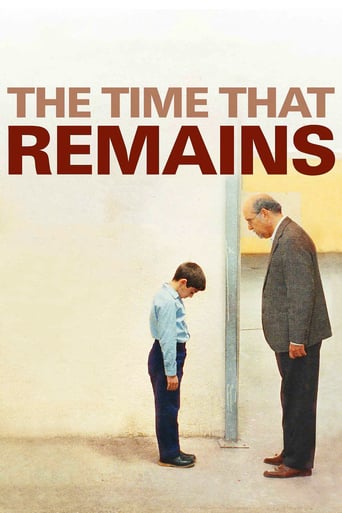

one of my absolute favorites!
... View MoreDisturbing yet enthralling
... View MoreYo, there's no way for me to review this film without saying, take your *insert ethnicity + "ass" here* to see this film,like now. You have to see it in order to know what you're really messing with.
... View Morewhat a terribly boring film. I'm sorry but this is absolutely not deserving of best picture and will be forgotten quickly. Entertaining and engaging cinema? No. Nothing performances with flat faces and mistaking silence for subtlety.
... View MoreSometimes, life throws at us things that over the years become too big to comprehend. Such are natural disasters, pandemic diseases, nuclear explosions, and wars.In his movie, released in 2009, Elia Suleiman sets on a journey to explore the genre of black comedy, so as to reveal to us the secret of coping with a tragedy of which the magnitude is overwhelming.It is the nature of human mind to always look for some form of normality, maybe a little static, but nevertheless, a feeling that your bases are covered, your life has a purpose and your entire existence in a certain place and at a certain time is not meaningless. This is what we, humans, do when gun battles, tanks and security surges are suddenly a persistent part of the daily routine. And this is exactly the focus of The Time That Remains. Half a century of tragedy is squeezed into an hour and a half of a laconic and precisely targeted shock therapy.Despite its smoothness and an accurately placed hint of suspense, this movie doesn't truly give you a moment of rest. There's no wallowing in self-pity here, no destructive mind blowing imagery; even the garden of executions is so well carved into the texture of the surrounding neighborhood that it appears natural despite your mind telling you that what you are looking at is a yelling contradiction to what is humanly acceptable.There's also no conflict, in a traditional sense of the word, around which the story would evolve. All there is is a deceptively distanced and only seemingly uninvolved bitterly comic narration about generations of painful struggle to remain human in a filled with nonsense reality, where even a direct participant finds himself merely an observer, trying to just be.The movie strikes as grotesque, largely satirical, very reflective and detailed. This effect doesn't wear off till the very last scene.When telling the truth becomes a taboo, the sensationalism of this movie is found in the peculiar way of drawing attention to what should not be discussed, because the subject makes us uncomfortable.Elia Suleiman resorts to various means offered by cinematography in order to break the unbreakable, to jump over the wall.There are no loud graphic scenes in this movie, nothing at all that an adult cannot handle; yet, it is heavily loaded with incredible emotions that run deep in the film's canvas, leaving you gulp for air at times.When deciding whether or not to watch this movie, don't hesitate. Just watch. And prepare lots of tissues, even if you are known for having a thick skin.
... View MoreThis is an evocative film by Elia Suleiman that was shown at IFC recently. The story takes us back to the city of Nazareth where the director was born. It is a chronicle of the events in that part of the world and the changes that have occurred there. It is basically an account of the life of Mr. Suleiman's parents as they lived the events that go back a number of years in the middle of the Israeli-Palestinian conflict that befell that area.Life as an Arab in Israel is examined by Mr. Suleiman at key points as they happened. Fuad, the father in the film, must deal with what comes his way. Life in the city goes through changes as history comes to change things for the family. There is a running joke about food sent from an aunt that no one wants. The main events happened in 1948, as the state of Israel was being born. Later periods take a look at other aspects of the life of what one feels is the family of Mr. Suleiman.The atmosphere of Nazareth, wit its amazing light is captured by the cinematographer Marc-Andre Batigne. Saleh Bacri, who plays Fuad, shows why he is one of the prominent actors working today. He made quite an impression in "The Band's Visit". The director, Mr. Suleiman shows up toward the end in an enigmatic segment where he seems to be absorbing the history he and his family witnessed in Nazareth.
... View MoreThe Time That Remains starts in 1948 in Palestine with the invasion by the Israeli armed forces. This event casts a long shadow over the entire movie. It's a Palestinian account, occasionally a very personal account, of how life has continued since then. The movie is contending that in cultural terms there's been a huge degradation, and people have lived in stasis, their lives not moving forward at all.The movie is a farce which reminds me of the Georgian cinematic tradition of military/political farces such as Brigands Chapter VII from Otar Iosseliani and Repentance from Tenghiz Abuladze. It's very funny at times, and very deadpan, but at others it's very poignant. For example there is literally a tug'o'war in a hospital corridor (shot from outside the building - a neutral absurd position typical of this film) between policemen and doctors concerning a wounded man on a gurney, who presumably is wanted for "questioning".It's an autobiographical film which is shot on a human level and is therefore a lot more palatable than other politically motivated movies on the Israeli-Palestinian conflict. It's a film that takes place over many years, culminating in the present day. Over the period there's a decline in health of the characters shown, and also in the cultural health, the young consume only American pop and films, gangsterism and culturally tolerated theft is commonplace. The movie could have been a lot stronger for sure on this point, Israeli forces have destroyed the Palestinian infrastructure. Given that it's a Palestinian point of view, I think it's remarkably even handed.Suleiman views the occupation as implacable, his neighbour (who is mentally broken by the occupation) one day converses with Suleiman's father and says that he's discovered the secret to fight the occupation, the answer is the (un-Muslim) option of drinking arak, once drunk on arak, the Israeli planes are close enough to be plucked out of the air. That's the level of impotence that I think the characters in the film feel about events.I think there's a sense of shame as well. I remember when Cheney's forces invaded Iraq, the speed with which they overcame the nation was viewed as a great shame for Arabs across the entire Middle East. The capitulation of Palestine is depicted the same way here, total and almost immediate, with the Mayor of Nazareth signing over the city to the Israelis without a word of protest. All we really see of Palestinian soldiers is a bunch of them jettisoning their keffiyehs and weapons and running for dear life before an engagement has even started. One man marches into an Israeli post and shoots himself as an act of defiance and protest, but this is portrayed with nil gravitas by Suleiman, as pointless as shouting at the wind.The film is really a treasure trove of absurd vignettes that I don't want to delve into too deeply and spoil the movie for you, but I've got a list of at least ten other highly memorable moments in this film.For you all you Americans out there, the movie is quite hostile towards American foreign policy. You won't see an American in the movie though. I don't think it's that controversial, it's pretty clear that the only real special relationship the US has had over the last half a century, in foreign policy terms, has been with Israel, and that's been to the detriment of the Palestinians.I think the movie is a masterpiece of cogent dissent.
... View MoreAs was the case for 'Divine Intervention', Elia Suleiman's former masterpiece, the viewer can't help but admire the originality of its style. What a wonderful thing that a Palestinian should be able to evoke the situation prevailing in his motherland and the Israeli-Palestinian conflict not in a full-frontal, simplistic, dogmatic way (which would be forgivable given the circumstances) but in an unexpected, humorous, quirky, poetic fashion, a little as if Harry Langdon, Buster Keaton and Jacques Tati had decided to tackle geopolitics for once. Suleiman's talent is really offbeat : contemplation in preference to action (the narrator played by Suleiman himself observes more than he acts); silence rather than significant dialog (the main protagonists hardly ever speak and those who express themselves the most are secondary characters saying only superficial things); symbolism before realism (the Israeli taxi driver lost in the turmoil of a summer storm, not knowing where he is going, not recognizing his country anymore).Occasionally very funny (the Iraqi soldier who can't find the battlefield; the gun of a tank following the coming and going of a young Palestinian in the process of taking out his trash bag and talking on his mobile phone without caring the least bit about the threat), 'The Time That remains' contains crazy gags which are a relevant reflection of the absurd atmosphere reigning in Palestine. But most of the time, the film consists in the poetic account of the odd life Palestinians are forced to live, concentrating mainly on the director's parents,a shy but loving mother and a fearless rebellious father, to whom the director pays homage. Not the type to wear his heart on his sleeve, Suleiman expresses his filial love with discretion and restraint. The scenes with his mother aged eighty and with his father dying in the car are particularly moving.'The Time That Remains' looks like no other film of any sort. Go and see it.
... View More